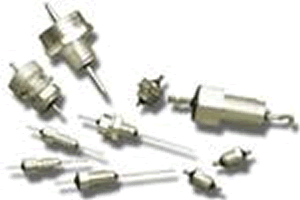All Quiet on the Industrial Front: Using Filter Connectors to Reduce Electromagnetic Noise
Industrial applications are prone to extraneous electronic noise. A variety of connector manufacturers design products that prevent and minimize electromagnetic interference and pulses and radio frequency interference.
By Paul Golata, Mouser Electronics

Filtered Connectors
Connectors are ubiquitous across the industrial workspace because they establish and secure the hardwired electromechanical interface between various electronic assemblies used to control industrial processes. Connector manufacturers design a range of products that reject and minimize spurious noise and provide the necessarily “clean” and proper signal for optimum performance. These electromagnetic-compatible products provide excellent solutions for electromagnetic interference and pulse (EMI/EMP) issues. Connector companies also want to design their products in a manner that minimizes and reduces both the expense and physical size of discrete external devices that might be employed in a secondary manner, as this saves designers time and money.
Electromagnetic Compatibility (EMC)
A variety of processes can be used to develop EMC components that are suitable for demanding applications. Solutions such as: reflection, reduction, suppression, absorption, grounding, and filtering focus on incorporating design aspects that reduce electromagnetic interference into an integrated assembly. The nature of the specific frequencies involved and the overall size, cost, and complexity of the connector determine what techniques should be considered. Here, we’ll focus on filter connectors, an EMC design choice that proves successful in many applications.
Filter Connectors Meet Tough Demands, Yet Minimize Noise
Filter connectors use internal capacitors, inductors, diodes, and, in some cases, a hybrid configuration of these elements to mitigate signal noise. Since the filters are part of the connector — in-line, rather than a separate piece — they minimize solder joints and connections, which offers increased reliability. The exterior of these connectors provides additional protection from environmental elements that may threaten the filter if it were mounted elsewhere. Additionally, because they are integrated with the connector, these filters are part of the outgoing testing that is performed on the connector, which guarantees the protection by specification and tests its EMC worthiness. In-line filter protection can be accomplished by using a blocking diode, which offers only a unidirectional path for the proper signal.
Varistors are increasingly used as the front-line solution for transient surge protection, and allow connector manufacturers to consider metal oxide varistors (MOVs), multilayer suppressors (MLSs), or transient-voltage suppression (TVS) diodes. HARTING offers a line of D-sub connectors that includes a ferrite choke to block high-frequency noise. Impedance matching can be done by design so that the signal source is transferred optimally with the minimal amount of signal reflection.
Other filter connectors use capacitors or capacitor arrays because they act as a selected frequency pass filter with a single capacitor. This solution offers excellent low frequency performance, which can be further enhanced by use of an inductor. An L-C or C-L filter arrangement can be optimized based upon the relationship between the source impedance and load impedance.
Additionally, other hybrid arrangements of capacitors and inductors may be suitable for specific designs. It may be necessary to provide off-board EMC filtering for high-voltage DC power lines. API Technologies’ API 51F-726-002 EMC feed-through filters (Figure 1) are designed to provide protection in harsh industrial environments. With a choice of C, L, or Pi filters, they are effective at filtering out noise on DC power lines.

Figure 1: EMC feed-through filters provide critical protection in harsh industrial environments. Sealed filters effectively filter out DC power line noise. (Image courtesy of Mouser)
Filtered connectors are also found in other demanding areas outside of industrial applications, including: aviation, military and defense, government, networks, security, and transportation applications. Common standards that may apply to such designs include Aeronautical Radio, Incorporated (ARINC) and various US military connector specifications (e.g., MIL-D-xxxxx).
If you are involved in high-noise applications, such as Industry 4.0, EMC connectors are an opportunity to save time and money while simultaneously increasing reliability and reducing size and mass. A wide range of EMC connectors are available at Mouser Electronics. With over 500,000 connectors in stock, Mouser is an authorized distributor for many leading connector manufacturers, including Amphenol, Glenair, HARTING, Molex, Phoenix Contact, TE Connectivity, and more. For more information, visit Mouser online.
 Paul Golata, Senior Technical Content Specialist at Mouser, contributes to the strategic leadership, tactical execution, and overall product line marketing direction for advanced technology-related products. He may be reached at [email protected].
Paul Golata, Senior Technical Content Specialist at Mouser, contributes to the strategic leadership, tactical execution, and overall product line marketing direction for advanced technology-related products. He may be reached at [email protected].





